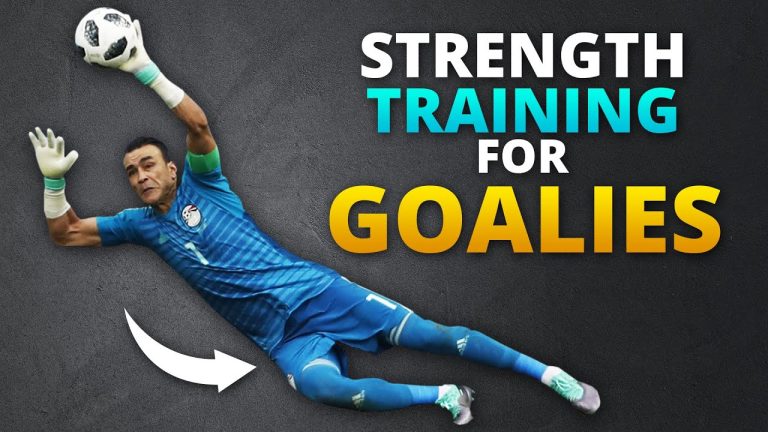Are you a goalkeeper looking to take your game to the next level? Look no further! In this article, we will explore the world of physical conditioning specifically designed for goalkeepers. Whether you’re a seasoned pro or just starting out, having a strong and agile body is crucial for success on the field. So, get ready to dive into the secrets of effective workouts and training techniques that will enhance your performance and keep you at the top of your game. It’s time to unleash your full potential as a goalkeeper!
Advantages
- Advantages of Physical Conditioning for Goalkeepers:
- Enhanced Strength and Power: Physical conditioning plays a vital role in improving the strength and power of goalkeepers. Regular workouts and exercises help in building strong muscles, especially in the core, arms, and legs. A stronger body enables goalkeepers to have better control over their movements, allowing them to dive, jump, and save shots with more power and precision.
- Increased Agility and Flexibility: Goalkeepers need to be quick and agile to react swiftly to shots and make saves. Physical conditioning exercises can significantly improve a goalkeeper’s agility and flexibility. Through exercises such as plyometrics, ladder drills, and dynamic stretching, goalkeepers can enhance their speed, coordination, and range of motion. This helps them cover more ground in the goal area and make acrobatic saves, reducing the chances of conceding goals.
Disadvantages
- Increased risk of injury: Goalkeepers undergo rigorous physical training to improve their conditioning, which can lead to an increased risk of injuries such as strains, sprains, and muscle tears. The repetitive nature of goalkeeping movements, such as diving and jumping, can put excessive strain on the body.
- Mental fatigue: The demands of physical conditioning for goalkeepers can be mentally draining. Balancing intense training sessions with other commitments can lead to mental fatigue, affecting their overall performance and decision-making abilities during matches.
- Lack of variety in training: Goalkeepers often have specific training routines focusing on their physical conditioning, which may limit their exposure to other types of exercises and training methods. This lack of variety can lead to boredom and reduced motivation.
- Time-consuming: Physical conditioning for goalkeepers requires regular and consistent training sessions, which can be time-consuming. This can make it challenging for goalkeepers to balance their training with other obligations, such as work or school.
- Pressure to maintain peak fitness: Goalkeepers are expected to maintain a high level of physical fitness throughout the season. This pressure can lead to stress and anxiety, as goalkeepers may feel the need to constantly perform at their best and avoid any decline in their physical abilities.
What are the recommended exercises for goalkeepers to do at the gym?
Goalkeepers in soccer should focus on specific exercises at the gym to enhance their performance on the field. By prioritizing strength, speed, and agility, goalkeepers can significantly improve their abilities. Key exercises like squats, bench presses, sprints, agility drills, and plyometrics should be incorporated into their training routine. These exercises not only build strength but also enhance their speed and agility, enabling them to maneuver swiftly and effectively between the goalposts.
To excel as a goalkeeper, it is essential to prioritize specific exercises at the gym. By targeting strength, speed, and agility, goalkeepers can elevate their game to new heights. Incorporating exercises such as squats, bench presses, sprints, agility drills, and plyometrics into their workout routine can provide them with the physical qualities necessary for success on the field. With dedication to these exercises, goalkeepers can maximize their potential and become a formidable force in the soccer arena.
What are some ways to enhance the fitness of my goalkeeper?
Are you looking to enhance your goalkeeper fitness? Look no further! Agility training is a game-changer when it comes to improving footwork, reaction time, and coordination. By incorporating drills that challenge your agility, such as ladder drills and cone exercises, you’ll sharpen your skills and become a force to be reckoned with in the goal. But that’s not all! Explosive power is another crucial aspect of goalkeeper fitness. To reach new heights and dive swiftly to make those incredible saves, try incorporating plyometric exercises like box jumps and explosive push-ups into your training routine. With dedication and these exercises, you’ll be leaping towards success in no time.
Looking to take your goalkeeping skills to the next level? It’s time to focus on your goalkeeper fitness! Agility training is a must when it comes to improving your footwork, reaction time, and coordination. By incorporating dynamic drills like ladder exercises and cone drills, you’ll enhance your agility and become a formidable presence in the goal. But wait, there’s more! Explosive power is another vital component of goalkeeper fitness. To skyrocket your jumping ability and dive with lightning speed, plyometric exercises such as box jumps and explosive push-ups are your secret weapons. So, lace up your gloves and get ready to soar to new heights with these training techniques.
Is muscularity necessary for goalkeepers?
Goalkeepers, the guardians of the goal, indeed benefit from being muscular. Muscular strength plays a crucial role in their performance, particularly when it comes to generating power during clearances and initiating counter-attacks. By having well-developed muscles, goalkeepers can efficiently propel the ball away from the goal, thwarting any potential threats and swiftly transitioning their team into an offensive play. Moreover, their muscular strength comes into play during vertical jumps, enabling them to leap high and challenge opponents in aerial battles. Thus, being muscular is not just advantageous but essential for goalkeepers to excel in their role.
When it comes to goalkeepers, muscular strength is a key asset that should not be overlooked. It significantly aids in various movements, especially during clearances and counter-attacks where power generation is paramount. The ability to forcefully clear the ball away from the goal not only prevents the opposition from scoring but also kick-starts potential counter-attacking opportunities for the goalkeeper’s team. Additionally, muscular strength is crucial for vertical jumps, allowing goalkeepers to soar through the air and effectively challenge opponents in aerial duels. Consequently, being muscular is vital for goalkeepers as it enhances their overall performance and equips them with the physical prowess required to thrive in their position.
Unleash Your Goalkeeping Potential: Maximize Performance with Physical Conditioning
Unleash your goalkeeping potential and maximize your performance on the field with the power of physical conditioning. As a goalkeeper, your role demands agility, strength, and endurance, and it is crucial to fine-tune your body to meet these requirements. By incorporating a comprehensive physical conditioning program into your training routine, you can enhance your reflexes, improve your speed, and boost your overall athleticism. From explosive plyometric exercises to targeted strength training, conditioning your body will enable you to dominate the goal, make game-changing saves, and elevate your performance to new heights.
Take your goalkeeping skills to the next level by unlocking the full potential of your physical abilities. Embracing a tailored conditioning program will not only enhance your performance on the field but also minimize the risk of injuries. By focusing on exercises that target key muscle groups, such as your legs, hips, and core, you can boost your explosiveness and agility, enabling you to react swiftly and effectively to any situation. Additionally, incorporating cardio exercises and endurance training into your routine will ensure you can last the entire match with peak energy levels, allowing you to make critical saves even in the final minutes. Unleash your goalkeeping potential today and witness the incredible impact that physical conditioning can have on your performance.
Power Up Your Goalkeeping Skills: Achieve Peak Performance with Effective Training
Power Up Your Goalkeeping Skills: Achieve Peak Performance with Effective Training
Elevate your goalkeeping abilities to new heights with our highly effective training program. Designed to power up your skills, our comprehensive program will equip you with the techniques and strategies necessary to excel in the net. Through a combination of rigorous drills, personalized coaching, and simulated game scenarios, you’ll develop lightning-fast reflexes, impeccable decision-making, and unwavering mental resilience. Our experienced trainers will guide you every step of the way, providing expert feedback and tailored advice to help you reach your peak performance. Don’t settle for average; power up your goalkeeping skills and become an unstoppable force between the posts.
Elevate Your Goalkeeping Game: Master Physical Conditioning for Optimal Performance
Elevate Your Goalkeeping Game: Master Physical Conditioning for Optimal Performance
In order to excel as a goalkeeper, mastering physical conditioning is essential for achieving optimal performance on the field. With a rigorous training regimen, goalkeepers can enhance their agility, speed, and endurance, enabling them to make lightning-fast saves and maintain a high level of focus throughout the game. By incorporating a combination of cardiovascular exercises, strength training, and flexibility routines into their workouts, goalkeepers can improve their reaction time, explosiveness, and overall athleticism. Additionally, focusing on core stability and balance exercises can help goalkeepers maintain a strong and stable foundation, allowing them to execute powerful and precise dives and jumps. By prioritizing physical conditioning, goalkeepers can take their game to new heights, becoming formidable forces between the posts.
In order for goalkeepers to excel in their performance and contribute to the success of their team, physical conditioning plays a crucial role. By incorporating a well-rounded fitness routine that focuses on agility, strength, and endurance, goalkeepers can enhance their reflexes, explosiveness, and overall athleticism. Additionally, tailored exercises targeting core stability and flexibility can help improve their diving and reaching abilities, enabling them to make those crucial saves. With dedication and commitment to their physical conditioning, goalkeepers can elevate their game to new heights and become an invaluable asset to their teams.



